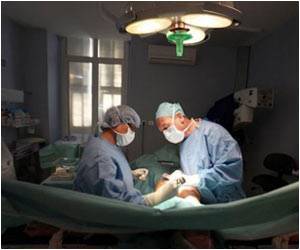Ambient background noise is a patient and surgical safety factor that can affect auditory processing among surgeons and the members of their team in the operating room (OR).

"The operating room is a very fast-paced, high-demand, all senses running on all cylinders type of environment," said study coauthor Matthew Bush, MD, assistant professor of surgery at the University of Kentucky Medical Center, Lexington. "To minimize errors of communication, it is essential that we consider very carefully the listening environment we are promoting in the OR."
To assess the effects of ambient noise on communication in the OR, the researchers created a noise environment similar to that of an OR and tested 15 surgeons with one to 30 years of operating experience. The surgeons' ability to understand and repeat words was tested using the Speech In Noise Test-Revised (SPIN-R) under four different listening conditions typical of OR environments. These conditions included quiet, filtered noise through a surgical mask and background noise both with and without music. Subjects were tested in two situations: engaged in a specific surgical task and task free.
The study showed a significant decrease in speech comprehension with the presence of background noise when the words were unpredictable. In addition, the surgeons demonstrated considerably poorer speech comprehension in the presence of music compared with a quiet environment or one with OR noise present. However, the addition of music became a significant barrier to speech comprehension only when the surgeon was engaged in a task.
The researchers concluded that OR noise can cause a decrease in auditory processing, particularly in the presence of music. Further, the ability to understand what is being said becomes even more difficult when the conversations carry critical information that is unpredictable.
Currently, miscommunication is one of the most frequently cited causes of preventable medical errors. For this reason, there is a growing interest in identifying overlooked variables that can lead to communication breakdowns among health care professionals.
"Our main goal is to increase awareness that operating room noise does affect communication and that we should foster the best environment in which we can communicate better," Dr. Bush explained. "This effort means that the surgical team needs to work diligently to create the safest environment possible, and that step may mean either turning the music off or down, or limiting background conversations or other things in the environment that could lead to communication errors and medical mistakes."
"I think it's important to demonstrate the effect of environmental operating noise on communication on a variety of different players in the operating room setting," Dr. Bush said. "Another step from here is to not only see how noise affects our understanding of speech, but how it affects our tasks, how it affects our ability to perform surgical procedures efficiently and effectively. That is a different stage and different study design completely, but these questions are all ahead of us as we investigate the effects of environmental sound on operating room communication."
Source-Eurekalert
 MEDINDIA
MEDINDIA




 Email
Email





